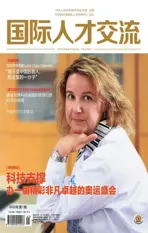“国家发展靠人才,民族振兴靠人才”
——《古语金句》之用人·选才
2022-02-17
盖有非常之功,必待非常之人。
【西汉】刘彻《武帝求茂才异等诏》
世界上非同寻常的功业,一定有待非同寻常、超凡脱俗的人来创立。
“It takes an extraordinary man to create an extraordinary work.”
[Western Han Dynasty 202 BC—8 AD] Liu Che:
To accomplish an outstanding feat requires outstanding talent.
千人之诺诺,不如一士之谔谔。
【西汉】司马迁《史记·商君列传第八》
众多唯唯诺诺、曲意逢迎的人,比不上一个率直勇敢、直言进谏的人。
“One honest official is worth more than a host of toadies.”
[Western Han Dynasty 202 BC—8 AD] Sima Qian:.
One official who speaks his mind is more valuable than a thousand yes-men.
邦之兴,由得人也;邦之亡,由失人也。得其人,失其人,非一朝一夕之故,其所由来者渐矣。
【唐】白居易《策林·辨兴亡之由》
国家的兴盛,由于得到人才;国家的灭亡,由于失去了人才。得到人才,失去人才,不是一天一夜、突然变化的结果,其原因,暗自滋长,日积月累,已经很久了。
“The rise of a state depends on gaining men; the demise of a state is the result of losing men. Gaining or losing such men is not a matter of one day or one night; it is a long drawn-out process.”
[Tang Dynasty 618—907] Bai Juyi:
A state flourishes if it can get men of genuine talent;a state collapses if it loses men of genuine talent. Gaining or losing such men doesn’t, happen overnight; it happens gradually.
任贤必治,任不肖必乱,必然之道也。
任贤必治,任不肖必乱,必然之道也。
【北宋】司马光《资治通鉴》

廉思 毛广淞 李纯 编著保罗·怀特(Paul White) 翻译外文出版社有限责任公司 2021年6月出版
任用贤能的人才,国家一定能够长治久安,任用宵小之徒、无能之辈,必然会引起混乱,这是理所当然的道理。
“Only when worthies hold office does proper rule come about. Appointment of the incompetent inevitably brings turmoil. This is an iron law.”
[Northern Song Dynasty 960—1127] Sima Guang:
It is a self-evident truth that if men of talent are appointed to office the state will of necessity be well governed, and that if nonentities are installed in office the result will be chaos.
为政之要,莫先于用人。
为政之要,莫先于用人。
【北宋】司马光《资治通鉴》
治国理政的头等大事,莫过于选用人才。
“Nothing is more important for government than choosing the right people.”
[Northern Song Dynasty 960—1127] Sima Guang:
As a key to good government,nothing is more important than choice of the right people.
好胜人,耻闻过,骋辩给,眩聪明,厉威严,恣强愎,此六者,君上之弊也。
【北宋】司马光《资治通鉴》
凡事争强好胜,追求高人一等,不愿听到批评,倚仗口才滔滔不绝,炫耀小聪明,对人爱摆威仪且严苛,恣意刚愎自用,这六点是君主的弊病。
“The six character flaws a gentleman must guard against are: exulting in success; aversion to criticism;loquacity; boasting; riding roughshod over others; and stubbornness.”
Provenance:
[Northern Song Dynasty 960—1127] Sima Guang:
The drawbacks in a gentleman’s character are sixfold: delighting in victory; turning a deaf ear to criticism; having the“gift of the gab”; flaunting petty accomplishments; being overbearing toward others; and being self-willed.
举才不出氏族,用法不及权贵,是以才不济务,奸无所惩。
【北宋】司马光《资治通鉴》
推举人才,不超出高门大户、贵戚氏族的范围;执行法令,不敢触碰权贵的利益,所以选出的人才难以担当大任,奸诈狡猾的人,也得不到惩处。
“Promotion of the talented should eschew birthright,and the laws should be blind to power and wealth; if not, then social problems will remain rampant, and the wicked go unpunished.”
[Northern Song Dynasty 960—1127] Sima Guang:
The elevation of capable men should not be based on the criterion of noble family, and the application of the laws should not be restricted by considerations of power or wealth; otherwise problems will remain unsolved, and evildoers will escape the punishment they deserve.
有功必赏,有罪必罚,则为善者日进,为恶者日止。
【北宋】司马光《资治通鉴》
有功劳,就一定会得到奖赏;有罪责,就一定会得到惩处,这样一来,做好事的人,会一天比一天多,而干坏事的人,就会一天比一天减少直至停止。
“Always reward the worthy, and always punish the unworthy, and there will be more and more of the former and fewer and fewer of the latter.”
[Northern Song Dynasty 960—1127] Sima Guang:
If meritorious men are invariably rewarded, and wrongdoers invariably punished, then the number of those who do good deeds will constantly increase while the number of those who do bad deeds will constantly decrease and even be completely eradicated.
明主用人也,使能者不敢遗其力,而不能者不得处其任。
【北宋】司马光《资治通鉴》
英明的君主,在任用人才时,让有才华有能力的人全力以赴,让那些没有能力的人得不到任用(避免其滥竽充数,尸位素餐,贻害人民)。
“A sagacious ruler, in his employment of people,ensures that those of ability use their talents to the full,and bars the inept from office. ”
[Northern Song Dynasty 960—1127] Sima Guang:
In appointing men to office, a wise ruler lets those of ability give free rein to their talents, and is wary of restraining them. At the same time, he ensures that those of no ability do not eat the bread of idleness while occupying sinecures and afflicting the people.
骏马能历险,力田不如牛。坚车能载重,渡河不如舟。
【清】顾嗣协《杂兴》
骏马能够穿越艰险、驰骋千里,但论起耕田的本领,它比不过田间的老牛;坚固的车子能负重前行,但是渡过江河时,它施展不开,还不如一条小船。喻意要想让人才各尽其用,就要避其短板,用其擅长的一面。
“A fine horse can traverse difficult roads, but an ox is better for plowing, A strong cart can bear a heavy burden,but a boat is better for crossing a river.”
[Qing Dynasty 1644—1911] Gu Sixie: “Random Thoughts”.
A first-rate steed can gallop a thousand miles and endure any hardship, but it is not as useful as an ox for plowing. A sturdy cart can carry a heavy load, but it is not as useful as a boat for crossing a river.
This metaphor points out that everyone has his own particular talent, and should be used so that he can give full play to it.
不知人之短,不知人之长,不知人长中之短,不知人短中之长,则不可以用人,不可以教人。
【清】魏源《默觚·治篇七》
不清楚人才的长处,不清楚人才的短板,不知道他长处中不足的地方,不知道他短板中的优点所在,那么,就很难做到合理地任用人才,或培育人才。
“Ignorant of a person’s strengths and weaknesses,and of the weaknesses in the former and strengths in the latter, then you cannot use him, cannot train him. ”
[Qing Dynasty 1644—1911] Wei Yuan:
If you do not know a person’s strong and weak points,or the flaws in his strong points and the strengths in his weak points, you can neither employ nor educate him.
我劝天公重抖擞,不拘一格降人才。
【清】龚自珍《己亥杂诗》
我劝上天(此处指皇帝与朝廷)重新振作起来,不受条条框框的限制,大刀阔斧选用各种各样的人才。
“I urge the Heavenly Lord to bestir himself and not let regulations stop him embracing men of talent.”
[Qing Dynasty 1644—1911] Gong Zizhen: “Random Poems Written in 1839”.
“I petition the Lord of Heaven (here meaning the emperor or the imperial court) to rally his energy and not be a stickler for rules, but reach out to talented people. ” (本文摘编自《古语金句》,标题为编者所加)
